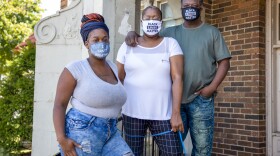Martha Bebinger
-
The first COVID-19 vaccines are being administered. There are, however, still great challenges ahead when it comes to making sure that people receive the vaccine sooner rather than later.
-
Health care is taking a bigger role in down-ballot races this fall, especially as the Supreme Court is set to hear another case that could determine the fate of the Affordable Care Act.
-
Few medical residents learn about the health effects of climate change. Now as wildfires sweep the West and hurricanes flood the Gulf Coast, the first published guidelines offer a way to start.
-
A survey of 17 cities found more than 50,000 pandemic-related eviction filings. Housing advocates worry that increased housing instability will lead to more COVID-19 and other illnesses.
-
More than 200,000 people in the U.S. have died of COVID-19. We hear from three areas of the country about how the pandemic has affected life there.
-
Doctors are researching why some patients remain unconscious for days or weeks, even after sedating drugs are withdrawn. They also worry that these patients aren't being given time to recover.
-
Hospitals Vary Treatment For Coronavirus PatientsWithout a cure for COVID-19, doctors are desperately trying to figure out the best treatment regimen for patients. And what they're trying, may look very different depending on the hospital.
-
"I know we will succeed somewhat and we will fail somewhat," says one of the plan's chief architects. "We won't be able to find every single person — but we will hopefully prevent a lot of deaths."
-
The CDC says reopening the U.S. economy during the coronavirus pandemic will require very aggressive contact tracing. WBUR health reporter Martha Bebinger talks about what that entails.
-
Sobriety programs are delivering services virtually, but the coronavirus pandemic is causing a lot of difficulties for people relying on services to continue their recovery from addiction.



